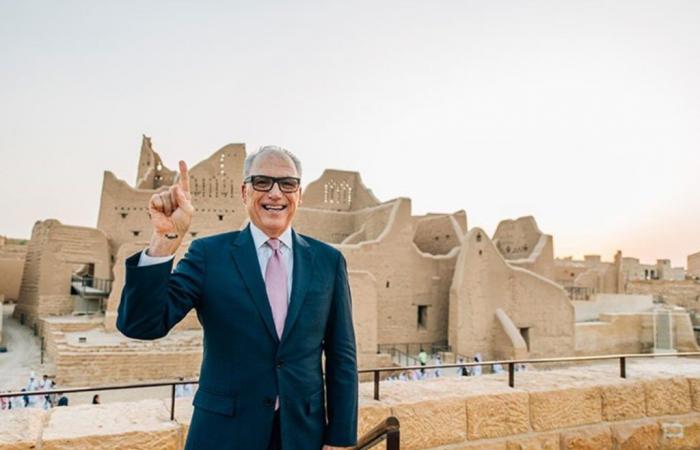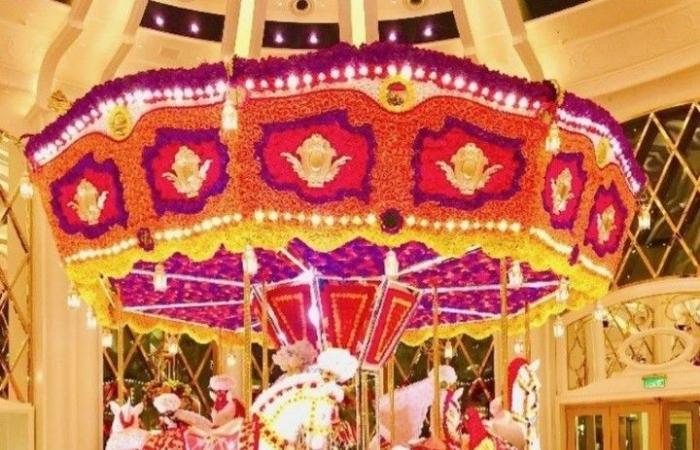Just when the dialogue ends, the eyes of the American businessman Gerard “Jerry” Inzerillo They get lost between the pages of a book that portrays the Colon Theater from Buenos Aires. He liked Colón, he liked Malba and other points of the Buenos Aires cultural cartography. But Inzerillo is not here to do tourism but to nurture and bond: he crown prince of saudi arabia has the objective of building a urban planning center with a focus on arts and knowledge and this cordial and talkative man is his guide in that task.
He was traveling in Brazil and decided that it was a good opportunity to spend a few hours in Argentina. With expert help, he made those two days pay off: spoke with top-level references from the Buenos Aires and national cultural and heritage spheres and left the guidelines for future projects planted. “They are all really wonderful professionals and artists and so I learned a lot from them. It was extraordinary because in less than 40 hours “I received something like an injection of vitamins from Argentina thanks to the collaboration of Teresa Anchorena,” he tells Clarín Culture and makes the gesture of taking a vaccine. She is radiant. Enthusiastic.
Inzerillo was born in 1954 in New York and Its name is synonymous with first-class hospitality.. His first steps were taken between the kitchens and tables for a catering company in his city and the hotels welcomed him. By 1987, when he was barely in his 40s, he was already co-founder of Morgans Hotel Group, a company that shaped the first group of “pop-culture” boutique hotels in the United States. At that moment, everything was already there: hotels, enjoyment and culture. The trident that brought him to Buenos Aires.
Inzerillo has been circulating in the most important hotels in the world for half a century. His career began at the Hilton, a chain for which he worked in various positions in the United States and Europe as well as the Middle East. In 2004, he moved to Four Seasons Hotels and Resorts as president of the Middle East and Africa region. In 2010, he was appointed CEO of the Diriyah Gate Development Authority Group, and now also of Diriyah Company. The list is much longer, but those axes explain his express visit.
“Argentina has always been brave and refined”, he says now, in a room on the first floor of the Faena Hotel. And he attributes these characteristics to the ability, throughout its history, to integrate different influences and knowledge from around the world into its own matrix. “That is why Argentina is different from the rest of Latin America,” he adds and concludes: “When God made this country, he was in a good mood.”
At the head of a megaproject
In 2017, Inzerillo was appointed CEO of the Diriyah Gate Development Authority Groupa mega development project that will invest more than 63,000 million dollars to develop the outskirts of Riyadh, the capital of Saudi Arabia (the largest economy in the Middle East, with 35 million inhabitants).
The development marked by modernity has an ancient heart: At-Turaif, declared a World Heritage Site by UNESCO, and ancestral home of that state, marks the heartbeat of that enormous undertaking that looks towards the past and the future. In the vicinity of that space they are developing more than 28 new hotels, restaurants and cultural spaces, including six museums.
That universe sounds under the direction of Inzerillo. It is estimated that when completed (estimated around 2030), the development will add 27 billion Saudi riyals to the country’s GDP, attract 150 million tourists and provide employment to more than 3 million people.
An additional beneficial effect will be improve the international image of the country, affected by the murder of Washington Post journalist Yamal Jashogyi, which occurred on October 2, 2018 at the Saudi consulate in Istanbul. Inzerillo highlights the changes that Saudi Arabia is making.
“We have a very unusual alignment of two visionaries at the same time in Saudi Arabia: a king, Salman bin Abdulaziz, 88 years old; and that of his son and his crown prince, Mohamed bin Salmán, 38. And something they both agreed on is that For the future to be prosperous you must know and celebrate your past. They consider the cultural integrity of Saudi Arabia to be like the roots of a tree. If they are healthy, the tree blooms,” she defines.
Inzerillo’s idea, then, is understand how those Argentine cultural institutions workhow the cultural heritage that he admires is managed and how sophisticated human teams are formed: “How are they managed?” he will say two or three times to return to the point that interests him.
Regarding the cultural ties between Argentina and the Middle East, the businessman says that these links exist. “There are several aspects, but two are very important: the first is that This nation has been a melting pot, which accepts everyone and that is seen in its cultural richness from artists and dancers to chefs or fashion design. Besides, It is a country with freedom of expression and we like that mentality that considers that we are all equal. We want to translate that into inclusiveness for a growing Saudi Arabia. Besides, we clearly admire the courage of Argentinians to be creative and experiment. We admire this and would like to learn from it,” she explains.
He would have liked to walk the city more because he appreciates the architecture and urban planning of Buenos Aires, but 40 hours and a dozen meetings did not allow him to do so. He has visited the CCK and asked for the references of the architects in charge of the project. He was also surprised by the existence of a “bank of artists” during the interview with authorities from the National Endowment for the Arts.
And although he says that he cannot anticipate too much about the content of those meetings, he explains that “Argentina is spectacular and could help us culturally and even in other areas such as agriculture.”
From their meetings takes contacts with companies, some of them even already have a project that would involve an investment of around a billion dollars. He will report this to the Saudi authorities upon his return. He intends in the next two or three years to “strengthen the already strong diplomatic relationship and create jobs in both countries as a result of mutual trade.”






